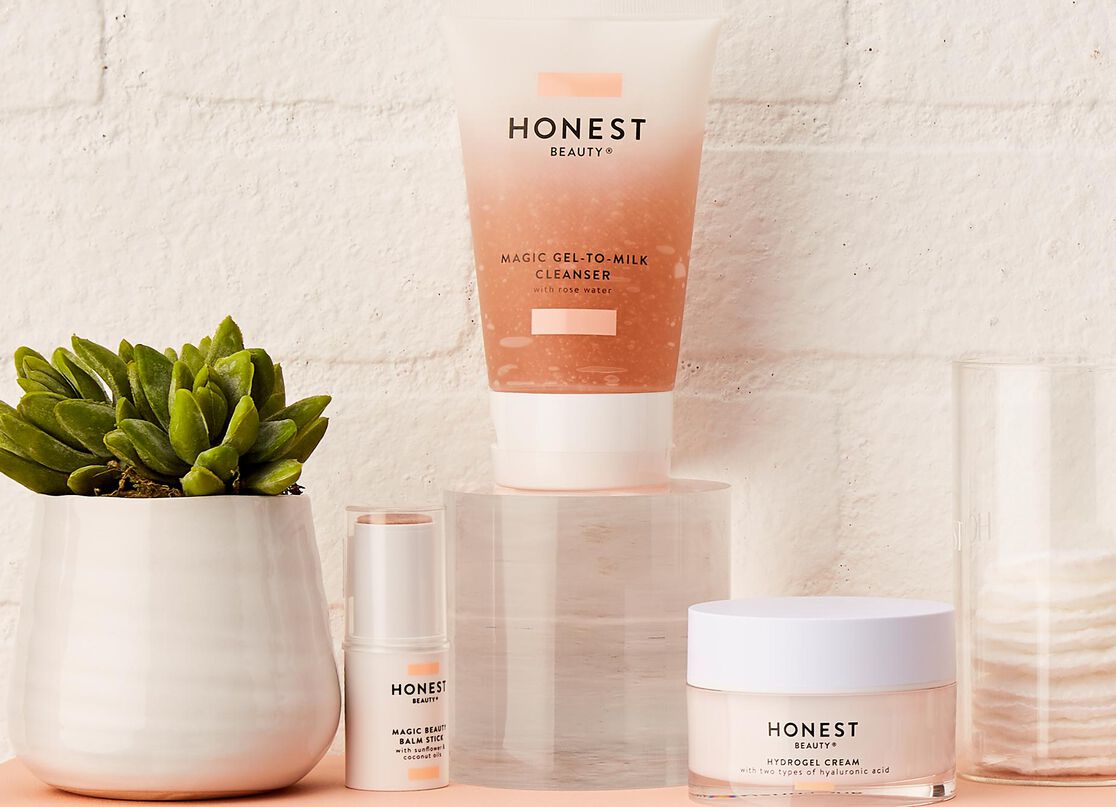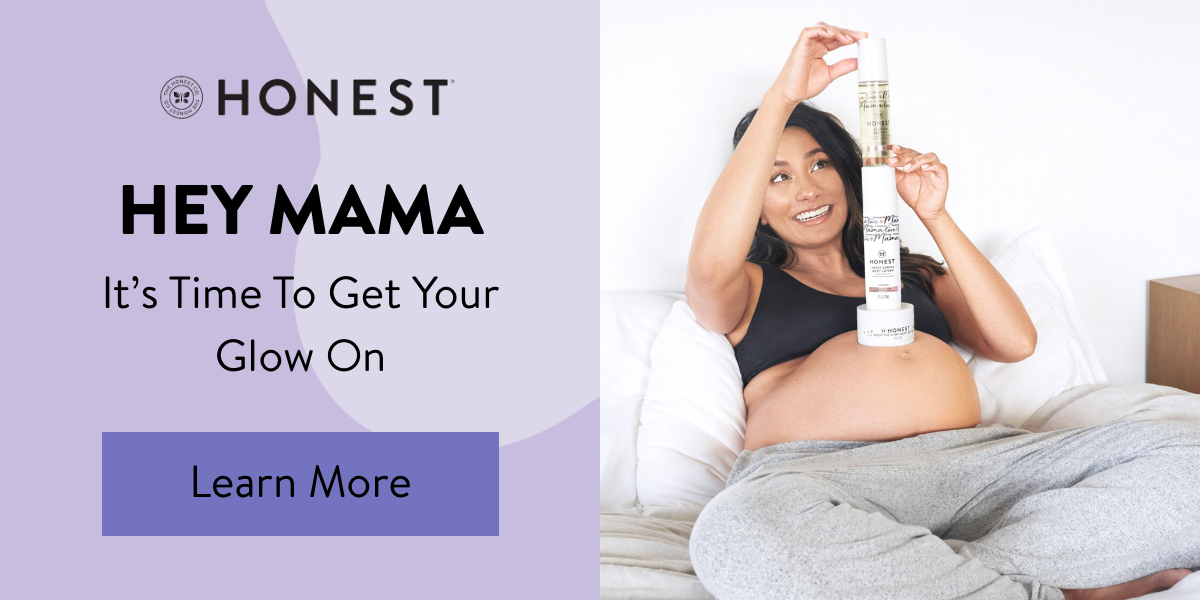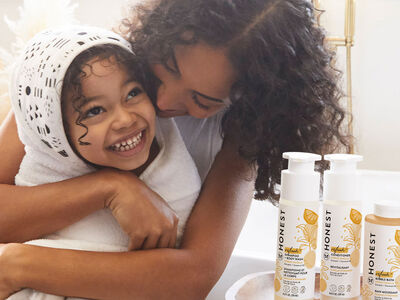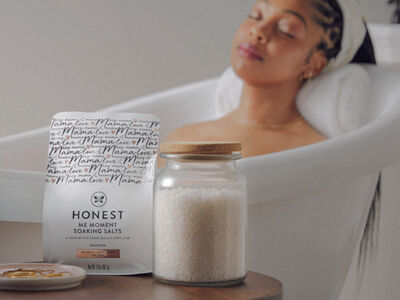Disclaimer: As always, if you’re pregnant or breastfeeding, check with your doctor before starting the use of any new product, as they know your history best.
Sometimes pregnancy can feel like a constant state of change, from your growing belly to your crazy sense of smell to the whole list of new products and foods you’re no longer allowed to have. R.I.P black coffee.
On top of that, skin changes and the need for a new skincare routine can be overwhelming for mamas-to-be. When it comes to skincare and pregnancy, research isn’t easy. What can you use for that pesky hormonal acne? Is sunscreen safe? What about that favorite facial moisturizer with hyaluronic acid? We had a hard time finding one simplified list of not just what you can’t use, but what you can use. So, we decided to make it for you so you can pick out skincare products with ease.
If you don’t know which skincare products are safe for pregnancy, we are here to help. At Honest, we’ve designed a full line of paraben-free makeup, skincare, and home products to keep you and your family healthy and happy. Read on for our list of pregnancy skincare no-nos and few clean skincare routines we put together for you. Now, you can stop reading ingredient lists on every skincare product and get on with that glow.
Can I use skin care products while pregnant?
Even though you’re pregnant that doesn’t mean you have to throw away your entire skin care routine. Pregnant women can, in fact, use skin care products, however, not all ingredients are safe for everyday use. The skin can change significantly during pregnancy, which means you will likely have to adapt your daily routine to cater to the new skin issues that arise. From melasma pigmentation to pregnancy breakouts, there are many different issues that pregnant mamas face.
Below we've created a list of ingredients that should be avoided during pregnancy.
Skincare Ingredients to Avoid When You’re Pregnant:
Salicylic Acid
Also known as beta hydroxy acid, this ingredient is often used to treat acne, but studies show that it’s safest to stop using them when you’re carrying a little one. Salicylic acid is a strong skin care ingredient and should be substituted out for a gentle alternative.
Retinoids
Topical retinoids are typically used in skincare products for their anti-aging effects, like diminishing the appearance of fine lines.However, doctors do not recommend using them while you're pregnant. Try switching out your topical retinoids for skincare products like Beauty Sleep Resurfacing Serum that utilizes antioxidants in its natural ingredient formula. Add sunscreen to make sure your face is safe from the sun.
Parabens
It’s always a good idea to avoid the types of preservatives that are known as parabens — like methylparaben, ethylparaben, propylparaben and butylparaben — but it’s especially important to avoid these potentially harmful ingredients during pregnancy. You can learn even more about parabens here. We recommend always opting for products with natural ingredients, whether or not you're pregnant.
Synthetic Fragrances
Some companies use the word “fragrance” as a blanket term and don’t actually list all the ingredients that fall under that term on their packaging — i.e. you’re not actually reading the full ingredient list. During pregnancy, it’s extra important to know about everything you’re putting in, on and around your body. Bottom line: keep fragrances out of your pregnancy skincare routine.
Formaldehyde Donors
Some skincare products use ingredients that are classified as formaldehyde donors as preservatives to prevent bacteria, yeast and mold growth. But, guess what? There are different preservative systems out there that we think are safer for pregnant women, so we suggest avoiding formaldehyde donors across the board.
Phthalates
Phthalates have been known to be used to soften plastics. But they also are used as solvents for other materials. Read more about phthalates and why to avoid them here.
Petrolatum
It’s best to avoid petrolatum (aka petroleum jelly) because it may contain potentially harmful contaminants. Learn more about petroleum jelly and petrolatum here.
Skincare Products That Are Safe During Pregnancy
During pregnancy your skin can start going a little crazy. Your skin changes and you may develop new issues that maybe you didn't have before. Whether you’re experiencing pregnancy acne, skin sensitivity, or your skin has suddenly gone from dry to oily, there’s not a one-size-fits-all fix that works for every woman. To help you out, we put together a few skincare routines that are safe for preggos, based on the different skin issues you might be experiencing.
If You Have Oily Skin:
Step 1: Double Cleanse with Makeup Remover Wipes + Calm on Foaming Cleanser.
Start by using the Calm on Foaming Cleanser to cut through any makeup or grime from the day or night, then massage a dime-sized amount of Gel-to-Milk cleanser all over your face before getting it wet. Once that’s done, splash water on your face and continue to massage as the gel turns to milk.
Step 2: Hydrate with Hydrogel Cream
Even if you have oily skin, you might still need some hydration especially after jumping out of the shower and toweling off. This advanced moisture-release cream with hyaluronic acid delivers firmer, smoother, more supple-feeling skin and gives you a dewy glow.
Step 3: Spot Treat with Deep Hydration Eye Cream
The skin around the eyes requires a little extra TLC. This eye cream is formulated with chamomile and calendula blend to help soothe those delicate areas. Dealing with stubborn dryness? You can dab this eye cream on other places on your face for targeted hydration.
If You Have Dry Skin:
Step 1: Cleanse with Gel-to-Milk Cleanser
This cleanser is also great for people with dry skin because it’s formulated to remove makeup and impurities without over-drying. Plus, pink kaolin clay leaves the skin feeling smooth and silky.
Step 2: Moisturize: with Hydrogel Cream
One of the best ways to moisturize dry skin by applying a cream with hyaluronic acid. With a mix of water and two forms of hyaluronic acid, this cream helps immediately replenish the skin and leave it feeling softer.
Step 3: Replenish with Daily Cream
This daily lightweight creamy moisturizer is best for 24-hour long-lasting moisturizer that won’t clog pores. Daily Cream is soothing and hydrating thanks to a micro-form of hyaluronic acid. Even sensitive skin can use this product because of its limited ingredients.
If You Have Sensitive Skin:
Step 1: Cleanse with Calm On
Great for any skin type, this mild foaming cleanser gets rid of makeup without drying you out. Plus, with soothing chamomile and calendula it gives you that post-spa refreshed feeling.
Step 2: Moisturize with Daily Calm
This lightweight and non-greasy moisturizer is great for people who need a little moisture and need sensitive skin products, but need it to be delivered in an extra-gentle way. It goes on feeling light and airy and leaves you with a nice glow.
Step 3: Spot Treat with Calm-and-Go Mist
This is one of our all-time favorite products. It’s calming, cooling, and skin nourishing. Spritz a few sprays on your face to calm redness and add moisture to dry skin. Vitamin B5 and hyaluronic acid work together to soothe skin. Tip: this stuff is great to have around when the baby comes too.
If You Have Pregnancy Acne:
Pregnancy breakouts can be tough because most of the tried-and-true acne treatments like retinol and salicylic acid are not recommended while you’re carrying a little one. We suggest giving our pregnancy safe makeup and skincare line a try, plus drinking a cup of spearmint tea in the morning and at night. Why? Because spearmint tea has been shown to help balance the hormones that cause this type of acne.
If you have dark spots, melasma or hyperpigmentation:
Beauty Sleep Resurfacing Serum can refine and perfect skin overnight. Fruit-derived AHAs gently smooth the surface of your face while you sleep.
We aim to provide you with the most honest and credible information possible. This article was reviewed for accuracy by The Honest Team and was written based on trusted sources that are linked at the bottom of the article.
blog_review_statement




